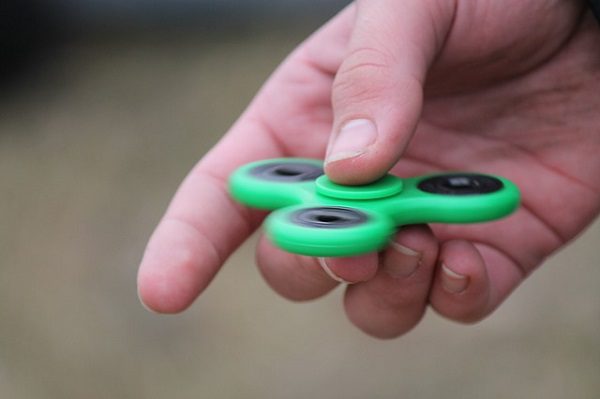‘Tis the season for allergies, asparagus and annoying approaches to Autism Awareness Month. For the next few weeks, news outlets will feature pieces that I describe as “Autistic Person Does A Thing,” in which autistic people are featured for making public appearances, meeting famous people, and wonder of wonders, getting dates for the prom.
People will debate the history and work of Autism Speaks. Neurotypical people will become aware of autism in ways that prompts acquaintances to tiptoe into my email inbox with awkward questions. Children’s television programs will feature a character who is different in a way that the neurotypical characters may or may not identify as autism. And in a few weeks, most people go back to acting like April didn’t happen.
The need to recognize the existence of autism and autistic people is real. The first Autism Awareness Month was established in 1970. But after nearly 50 years of activists pushing for broader representation, parents of newly diagnosed children still find themselves completely adrift, having no idea what the word “autism” would mean for their child beyond the therapies and special education plans.
Adults still shuffle between specialists trying to identify a problem their parents dismissed as laziness or disobedience. Media depictions of autistic people still rely heavily on stereotypes.
As far as awareness has come, it still predominantly centers people who are not autistic. The stories are often more about the “autism mom” or the neurotypical girl who agreed to go to the prom with her autistic classmate than about the living, breathing autistic people involved. Autistic people are infantilized and objectified in the very pieces that seek to represent them. While some discussions on autism do need to focus on neurotypical people, not helping one’s audience connect to someone different makes for bad representation and worse storytelling.
Centering Autism Awareness Month Like We Do with Other Designated Months
As an African American Muslim woman, I am very used to the various parts of my identity being ignored by dominant social groups. It’s not surprising when I can’t find my foundation shade in stores or faces that look like mine in management. It is a nice surprise when major greeting card companies acknowledge Ramadan or Eid, but I’ve spent too long learning to not expect it.
There are still areas where African Americans, Muslims and women are fighting for historical “firsts.” I’ve alternated between fighting for inclusion and rolling my eyes and deciding that anyone who does not wish to include me does not deserve me.
But, while I sort out how to cope with bigotry, I have easily identifiable communities to connect with. From Black Twitter to HBCUs to the National Museum of African American History of Culture, I can find people who can articulate my need for representation better than I can. There are magazines and organizations devoted to examining how Muslims are represented in every area of life.
Feminist and womanist organizations, publications, and public intellectuals abound. I have a family and a community who shares and understands my struggles, even if we rarely agree on solutions. As an African American, I can find representation year-round, and if I can’t find it in mainstream media, I have resources to find films by Black filmmakers, books by Black authors, and newspapers that report on and for local Black communities. Black History Month was established in the United States in 1970, and the progress made so far has been astonishing, even with all that has yet to be done.
Even a newer celebration such as Women’s History Month has a broad reach. Established in 1987, highlighting the need for representation has given rise to discussions on media depictions of women and girls in programming for all ages. We now have books about and by powerful women to guide our vision on creating broader opportunities for women, and to support the ambitions of the next generation.
While we have so much further to go in terms of women’s representation in many areas of society, we have promising ideas of where the next steps should lead, and we have many organizations and individuals working on economic, educational, social and political equality for women. There’s no uniform idea of what progress ought to look like, but the debates over that strengthen and focus the efforts towards equality.
What if the coverage and public discussion of Autism Awareness Month were to resemble that of Women’s History Month? Social media posts and local news articles would no longer feature employers bragging about hiring an autistic person for menial labor. We’d see more profiles of autistic people talking about how their autism shapes their experience at work. We would be hearing more calls for greater representation and accommodation of autistic people in the workplace at all levels.
Autistic characters would be more common in television and movies. We’d talk about how employers are allowed to pay disabled workers a subminimum wage, and how this creates and maintains a wage gap that can’t be explained by the quality of the work alone.
When We Put Autistic Voices First
Things would change for autistic children and their parents. Autistic characters in children’s television would not be confined to an April debut and never seen again. Parents of autistic children could point to books written for autistic children by autistic authors. Teachers would be encouraged to offer lessons about autistic historical figures or to invite autistic speakers to discuss how autism shapes their lives.
There would be recreation and education programs that offer more than accommodation but would celebrate the ambitions and achievements of autistic people to inspire future generations.
When my son started preschool, it was a very different process than I’d expected when he was born. The process began not with me looking online for highly rated preschools, but with the battery of specialists we saw to get his initial diagnosis of autism. After the evaluations, reports from therapists, and enough paperwork to kill a forest, I took my son to a special preschool with a class for autistic children.
I peeked in to see kids playing happily, but also flapping, humming and rocking. Just before we knocked, I told my son, “These are your people — I think you’ll have a good time.” My son’s people deserve more than they’ve been given. They deserve to be heard. They deserve to be someone’s prom date for the sake of friendship and sweet dance moves, not pity. They deserve representation that doesn’t vanish in four weeks.
They deserve more than “awareness.” They deserve equality.













